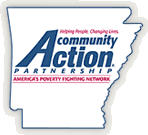
WHO WE ARE: An historic network of 16 community-based private, nonprofit organizations and its support office, the Arkansas Community Action Agencies Association (ACAAA), and many local, state, regional, and national partners and supporters, which has helped thousands of people of low income advance economically and socially for more than 40 years. The agencies, financed by public and private local, state and federal sources, are the primary community-based antipoverty institutions in the state, established under national landmark legislation passed by Congress in 1964 to “eliminate the paradox of poverty in the midst of plenty. . .” (The 16
WHAT WE DO: Operate a wide range of locally developed programs – about 40 of them – that offer opportunities, services and support (including much encouragement) to help individuals and families gain the basic necessities and achieve economic self-sufficiency that will enable them to have more fulfilling, productive and contributing lives, for the betterment of individuals, families, communities. The programs provide help in attaining education, training, employment, housing, food, transportation, child care, and other needs. They help people of all ages, from children to the elderly, and range from dental and family planning clinics to emergency shelters and personal home care for the elderly; substance abuse prevention and multicultural education; assistance in saving income and buying a first home; and community-wide initiatives and leadership in coalitions that teach youths value-based golf, reduce unwed teen births, advance energy efficiency and affordability and economic security. Primary programs include Head Start for preschool children (some centers now provide care for infants and toddlers); the Weatherization Assistance Program, which makes the homes of those of low income more energy efficient, healthy and safe; Low Income Home Energy Assistance Program, which in the last year paid more than $11 million to 119 utilities to help pay energy bills of thousands of their customers; transportation to work, hospitals and doctors’ offices, including a $1-a-ride citywide shuttle in Helena-West Helena; a network of food banks and pantries, and the distribution of government surplus commodities. We communicate continually about the work and worth of community action, to strengthen public awareness and support, including organizing news conferences and other events, and work with elected officials and state and national legislators to help them better understand the complex issue of poverty and urge them to do more to provide opportunities, services and support to help people advance.
HOW WE DO IT: Work with the state Office of Community Services (OCS) of the Arkansas Department of Human Services and with many other state, federal, regional, and national agencies, organizations, and groups, including schools, churches, businesses, civic groups and governments, to identify needs and generate resources for programs and projects built around the needs. Case management and other outcome-based techniques are used to more comprehensively help individuals and families overcome barriers and advance economically and socially. A peer assistance review program and a federally mandated Results-Oriented Management Accountability (ROMA) system continually advances efficiency and effectiveness of the agencies and their clients.
CONTRIBUTION: The community action agencies have contributed significantly to the reduction of poverty in the state in the last four decades – the rate was pushed to 17.6 percent of 2.7 million people, or 448,463 people, in 2004, from 18.5 percent, or more than 500,000 people the year before, according to the latest census figures, helping not only individuals and families but also neighborhoods and communities throughout the state. (Weatherization itself has injected $94 million into cities and counties since it was begun in 1976, improving more than 65,000 homes and affecting thousands of lives, including many elderly, disabled and children.) The agencies, in the last year, injected $132 million into communities to help more than 200,000 people, using the $7.8 million in the federal Community Services Block Grant funds to leverage $124.2 million more in other resources, including $93 million, other federal funds; $21 million, private sector; $9 million, state; and $400,000, local. The agencies employed more than 2,000 people; had the support, and oversight, of about 300 board members who represent every sector of the communities they serve, and recruited more than 25,000 volunteers who donated more than 700,000 hours, whose work was valued at about $6 million.
RECOGNITION: A growing number of elected officials and leaders in private industry are recognizing the value of community action, as a force to help people advance and as an improver of whole communities. Gov. Mike Beebe, as attorney general, called community action work “noble,” and of a “high calling,” and said “more people need to be involved in it.” Former Gov. Mike Huckabee praised the agencies as givers of hope and help and their clients as “special people” because of “their commitment to improving their own lives.” Through community action, he said, they have “found two things that change life forever for everyone of us – hope and help.” U. S. Senator Blanche Lincoln of
THE COMMUNITY ACTION AGENCIES, and the counties they serve: Arkansas River Valley Area Council, Dardanelle (Franklin, Logan, Conway, Yell, Perry, Johnson, Pope, Polk, Scott); Black River Area Development Corporation, Pocahontas (Clay, Lawrence, Randolph); Central Arkansas Development Council, Benton (Saline, Hot Spring, Montgomery, Pike, Clark, Ouachita, Columbia, Calhoun, Union, Dallas, Pulaski, Lonoke); Community Action Program for Central Arkansas, Conway (White, Faulkner, Cleburne); Community Services Office, Hot Springs (Garland); Crawford-Sebastian Community Development Council, Fort Smith (Crawford, Sebastian); Crowley’s Ridge Development Council, Jonesboro (Craighead, Cross, Crittenden, Greene, Jackson, Poinsett, St. Francis, Woodruff); Economic Opportunity Agency of Washington County, Springdale (Washington); Mid-Delta Community Services, Helena (Phillips, Monroe, Prairie, Lee); Mississippi County Arkansas Economic Opportunity Commission, Blytheville (Mississippi); North-central Arkansas Development Council, Batesville (Fulton, Izard, Sharp, Stone, Independence); Office of Human Concern, Rogers (Benton, Carroll, Madison); Ozark Opportunities, Inc., Harrison (Van Buren, Searcy, Boone, Marion, Baxter, Newton); Pine Bluff Jefferson County Economic Opportunities Commission, Pine Bluff (Jefferson, Arkansas, Lincoln, Cleveland, Grant); Southeast Arkansas Community Action Corporation, Warren (Bradley, Drew, Desha, Ashley, Chicot); Southwest Arkansas Development Council, Texarkana (Little River, Miller, Hempstead, Lafayette, Howard, Sevier, Nevada).